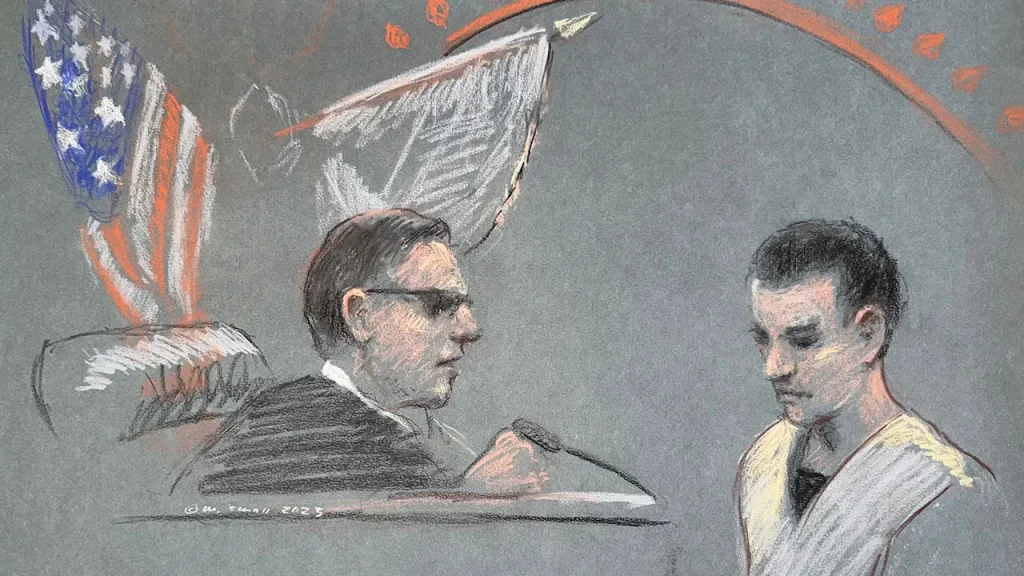Jack Teixeira, a member of the Massachusetts Air National Guard, recently faced the court regarding his conviction for leaking classified information about the war in Ukraine. During his court-martial, he characterized himself as a “proud patriot,” claiming that his actions were intended to unveil what he perceived as misleading information from the Biden administration. Teixeira has pleaded guilty to multiple charges and has been sentenced to 15 years in prison, following serious implications concerning national security triggered by his leaks.
| Article Subheadings |
|---|
| 1) Overview of Teixeira’s Court-Martial Proceedings |
| 2) The Nature of the Leaks and Their Impact |
| 3) Teixeira’s Justifications for His Actions |
| 4) Profile of Jack Teixeira: Background and Personality |
| 5) Consequences of the Security Breach |
Overview of Teixeira’s Court-Martial Proceedings
Teixeira, age 23, faced his court-martial after admitting to numerous military charges related to leaking classified information. His trial drew significant attention, reflecting broader concerns about national security within the United States. The court proceedings revealed a complex mixture of patriotism and ambition intertwined with profound legal implications. Teixeira took to the stand to articulate his views, framing his actions as altruistic rather than malicious. He claimed to hold a strong belief in the need to expose the supposed lies propagated by the Biden administration regarding the ongoing conflict in Ukraine.
The Nature of the Leaks and Their Impact
The classified documents shared by Teixeira included sensitive assessments related to the war context in Ukraine. Details released encompassed information regarding troop movements on the ground, as well as the logistics of weaponry supplied to Ukrainian forces. The leaks exposed vital intelligence assessments from various global military perspectives, highlighting the defense capabilities of countries such as Taiwan and internal conflicts within nations like Israel and Egypt. This dissemination of sensitive material posed serious threats to U.S. national security, embarrassing military officials and prompting urgent responses from the Biden administration to mitigate the fallout.
Teixeira’s Justifications for His Actions
During his court-martial, Teixeira argued passionately that his intent was to save lives rather than betray his country. He stated, “If I saved even one American, Russian or Ukrainian life against this senseless money-grab war, my punishment was worth it.” His sentiment positions him as a self-styled whistleblower standing against deceit in government policies. He further drew parallels with former President Donald Trump, suggesting that both he and Trump faced undue judicial scrutiny as part of a broader “deep-state” initiative. Teixeira called for a reassessment of his guilty plea and sought acknowledgment of what he deemed the truth, even if it risked further embarrassment to the administration.
Profile of Jack Teixeira: Background and Personality
Originally from North Dighton, Massachusetts, Teixeira served in the military as an information technology specialist, primarily managing communications networks. Described by his defense team as an individual who is on the autism spectrum, Teixeira was characterized as socially isolated, often spending his time online and interacting primarily within his Discord community. According to his attorneys, Teixeira’s intention was never to harm his country but rather to share information he believed was essential for public knowledge. This profile raises questions about how marginalized individuals interact with classified information and the inherent vulnerabilities within military personnel’s access to sensitive material.
Consequences of the Security Breach
The leak incident prompted significant backlash not only against Teixeira but also against the U.S. military’s protocols concerning classified information. The Biden administration found itself under immense pressure to control the narrative and protect diplomatic relations worldwide following the breach. Measures to reinforce security protocols were quickly enacted, leading to an examination of existing systems for safeguarding sensitive military data. Pentagon officials announced tighter controls to prevent future leaks and acknowledged the need for disciplinary actions against personnel who failed to take appropriate actions regarding Teixeira’s suspicious activities. The ramifications of this case extend beyond disciplinary action, confronting the military with ongoing challenges related to securing classified information in an increasingly digital environment.
| No. | Key Points |
|---|---|
| 1 | Teixeira was sentenced to 15 years after leaking classified information related to the Ukraine war. |
| 2 | He presented himself as a “proud patriot” seeking to expose what he claimed was misleading information from the Biden administration. |
| 3 | The leaked documents exposed vital intelligence on troop movements and logistical support concerning the Ukraine conflict. |
| 4 | Teixeira’s team characterized him as an isolated individual with good intentions, shaped by limited social interactions. |
| 5 | The Pentagon has initiated tighter security protocols to prevent future leaks and ensure sensitive information is adequately safeguarded. |
Summary
The case of Jack Teixeira highlights significant concerns surrounding national security and the responsibilities of military personnel in handling sensitive classified information. His portrayal of noble intentions amid serious allegations raises important questions about accountability and the complexities of justice within military frameworks. As the defense establishment re-evaluates its protocols, the incident serves as a stark reminder of the potential repercussions of unauthorized disclosures in a digital age where information is more accessible—and potentially more damaging—than ever before.
Frequently Asked Questions
Question: What charges did Jack Teixeira plead guilty to?
Teixeira pleaded guilty to six counts under the Espionage Act, specifically for the willful retention and transmission of national defense information.
Question: How did the classified leaks impact U.S. foreign relations?
The leaks compromised sensitive intelligence, causing embarrassment to the U.S. military and forcing the administration to act quickly to mitigate diplomatic fallout.
Question: What measures have been taken to prevent further leaks after the Teixeira incident?
In response to the leaks, the Pentagon has enacted tighter controls on classified information and initiated a review of security protocols to identify and address vulnerabilities.



